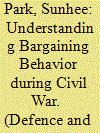| Srl | Item |
| 1 |
ID:
138308


|
|
|
|
|
| Summary/Abstract |
Traditional bargaining theory predicts that groups will demand and concede as much as their relative power allows. However, scholars who study bargaining in the civil war context suggest that governments often overcompensate a rebel group to reach an agreement because the rebel group typically feels insecure. This paper argues that depending on the relative power distribution between groups, either a rebel group or government involved in a civil war can feel insecure at the bargaining table. The weaker bargaining participant, whether government or rebel, is expected to feel insecure and thus demand more political power in a postwar state than its power share predicts, while the stronger group is expected to be willing to overcompensate the weaker group to assuage its security concerns. Using a new data set on political power-sharing bargaining during civil war, my analysis supports this expectation.
|
|
|
|
|
|
|
|
|
|
|
|
|
|
|
|
| 2 |
ID:
189404


|
|
|
|
|
| Summary/Abstract |
This paper provides a new approach to studying the behavior of groups engaged in civil war termination bargaining by focusing on the commitment problem. Extending the basic Rubinstein bargaining model, the model presented here has the added feature of a reneging option for the stronger group after an agreement is reached. This leads to the prediction that when groups expect the absence of an enforcement mechanism, the stronger group makes a larger concession, while the weaker group makes a more demanding offer, than would be expected according to the relative power dynamic between groups. On the other hand, when groups expect that a third-party peace operator will enforce an agreement, groups’ offers more closely reflect their relative power situation. To illustrate the causal process of groups’ bargaining behavior, five bargaining attempts during Sierra Leone’s civil wars from 1991 to 2002 are examined.
|
|
|
|
|
|
|
|
|
|
|
|
|
|
|
|